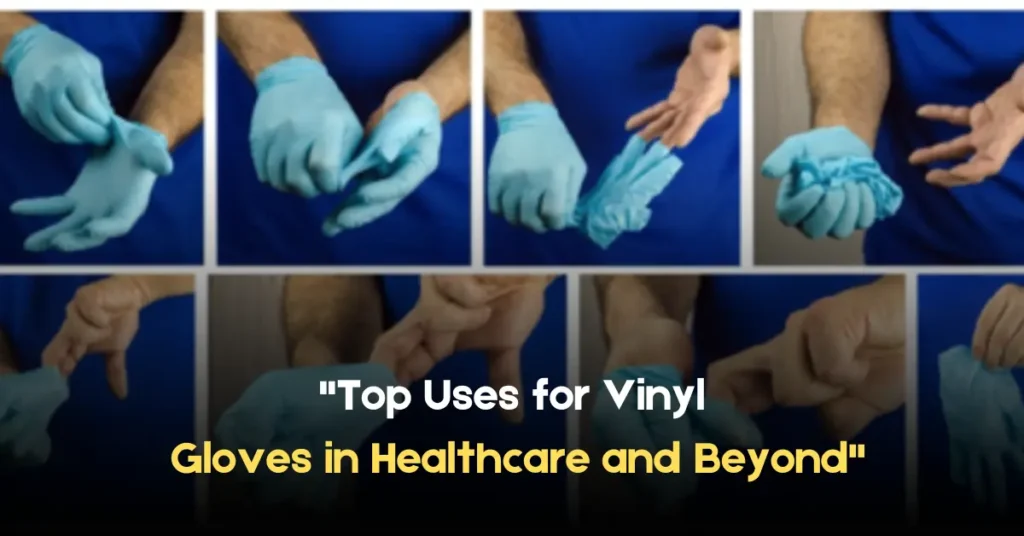Gloves are an essential part of protecting ourselves and others from potential harm. They come in various types, such as latex, nitrile, and vinyl gloves. Each type has its own set of benefits and drawbacks, but vinyl glove often get overlooked in favor of their more popular counterparts.
In this blog post, we will delve into the top uses for vinyl gloves in healthcare settings and explore how they can be beneficial across various industries. We will also look at some important factors to consider when choosing the right glove for your needs.
Section 1: Understanding Vinyl Gloves – What Sets Them Apart?
Before we dive into the many uses of vinyl gloves, it’s important to understand what sets them apart from other glove materials.
1.1 Material Composition
Vinyl gloves are made from polyvinyl chloride (PVC), a synthetic plastic material that offers excellent flexibility and resistance to chemicals. This makes them ideal for use in applications where there is a risk of exposure to harmful substances.
1.2 Cost-effectiveness
One significant advantage of vinyl gloves is that they are generally more affordable than latex or nitrile gloves. This makes them a popular choice for institutions that require large quantities of disposable gloves on a regular basis.
1.3 Latex-free
For individuals with latex allergies or sensitivities, vinyl gloves offer a safe alternative as they do not contain any natural rubber latex proteins.
Section 2: Top Uses for Vinyl Gloves in Healthcare Settings
Vinyl gloves have numerous applications within healthcare environments, providing protection against contamination risks while ensuring patient safety.
2.1 Medical Examination Purposes
Medical professionals often use vinyl gloves during routine examinations to protect themselves from coming into contact with bodily fluids or other contaminants while maintaining patient comfort.
2.2 Dental Procedures
Dentists and dental hygienists frequently use vinyl gloves when performing procedures on patients to protect themselves from exposure to blood, saliva, and other fluids.
2.3 Laboratory Work
In clinical laboratories, technicians utilize vinyl gloves when handling chemicals or biological samples to prevent cross-contamination and ensure accurate test results.
2.4 Long-term Care Facilities
Staff members at long-term care facilities such as nursing homes often rely on vinyl gloves for tasks that involve direct contact with residents, including bathing, dressing, or administering medications.
Section 3: Vinyl Gloves Outside of Healthcare – Exploring Other Industries
The versatility of vinyl gloves means they are not limited to healthcare settings; they can also be beneficial in a variety of other industries.
3.1 Food Service
Vinyl gloves are commonly used in food service roles due to their affordability and compliance with food safety regulations. They help prevent cross-contamination between raw and cooked foods while protecting workers from potential allergens.
3.2 Janitorial & Cleaning Services
Janitorial staff members regularly use vinyl gloves when cleaning public spaces or handling hazardous cleaning chemicals, providing protection against skin irritation and chemical burns.
3.3 Salon & Spa Services
Professionals in the beauty industry often wear vinyl gloves during treatments such as hair coloring or waxing to protect both themselves and their clients from potential allergic reactions or infections.
3.4 Childcare Centers
Childcare providers may choose to wear vinyl gloves during diaper changes or while handling soiled clothing to minimize the risk of spreading germs amongst children in their care.
Section 4: Factors to Consider When Choosing Vinyl Gloves for Your Needs
When selecting the right glove for your needs, it’s essential to consider several factors beyond just material type:
4.1 Glove Size & Fit
Proper sizing is crucial for ensuring optimal comfort and dexterity while wearing gloves. Be sure to reference manufacturer sizing charts to find the best fit for your hand size.
4.2 Glove Thickness
Depending on the intended use, you may need a thicker glove for added protection or a thinner glove for improved tactile sensitivity. Most vinyl gloves range from 2-5 mils in thickness.
4.3 Powdered vs. Powder-free
Some vinyl gloves are powdered, making them easier to put on and take off, while others are powder-free to reduce the risk of irritation or allergic reactions.
4.4 Industry-specific Requirements
Certain industries may have specific requirements or certifications that your gloves must meet (e.g., food service gloves must be FDA-approved). Be sure to research any relevant guidelines before selecting your gloves.
Conclusion: The Value of Vinyl Gloves Across Various Applications
As we’ve seen throughout this blog post, vinyl gloves offer numerous benefits across various industries – from healthcare settings to food services and beyond. Their affordability, latex-free composition, and chemical resistance make them an attractive option for many applications where other glove materials might not be suitable.
When choosing the right glove for your needs, it’s essential to consider factors such as sizing, thickness, powdered versus powder-free options, and any industry-specific requirements that may apply. By taking these factors into account, you can select the ideal vinyl glove solution for your unique situation – ensuring effective protection without sacrificing comfort or dexterity.
We encourage our readers to explore the versatility of vinyl gloves further and share their thoughts on how they have utilized them within their own professions or personal lives. With the right understanding of their properties and proper selection, vinyl gloves can play a vital role in promoting safety and hygiene across various industries. So, whether you’re in healthcare, food service, cleaning services, or another field entirely – consider giving vinyl gloves a try for your next task that requires hand protection. You may be pleasantly surprised by their quality and effectiveness. Let’s continue to prioritize safety and explore all the possibilities of this ubiquitous glove material!
